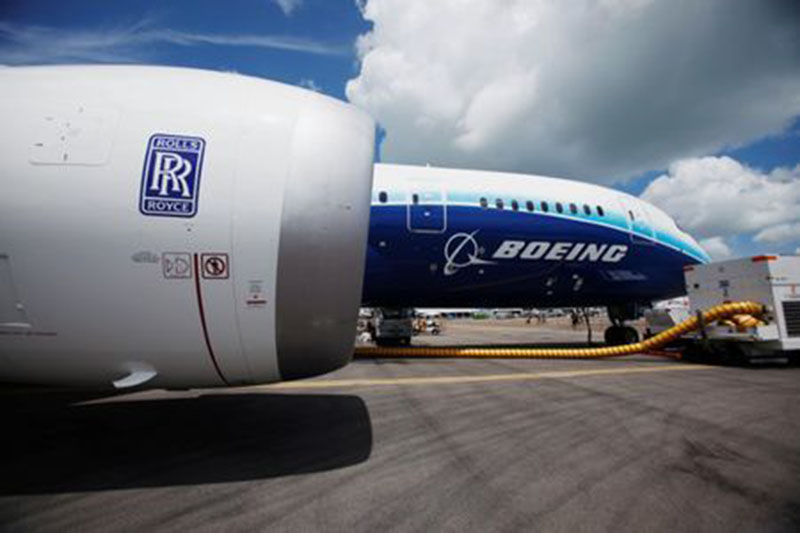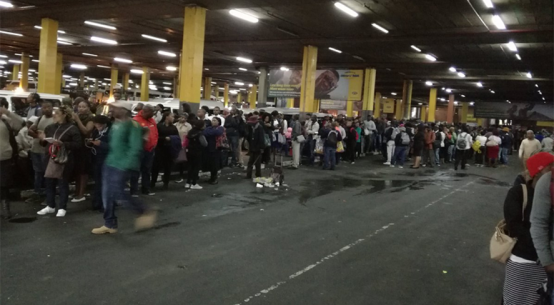
FILE PHOTO: A view of one of two Rolls Royce Trent 1000 engines of the Boeing 787 Dreamliner during a media tour of the aircraft ahead of the Singapore Airshow in Singapore February 12, 2012. REUTERS/Edgar Su/File
London (Reuters) – Rolls-Royce requires more money and more inspections to fix problems with Trent 1000 engines on Boeing 787 Dreamliner planes, leading to further disruption for airlines and testing relations between Rolls and its customers.
Problems with engine turbine blades wearing out sooner than expected have hampered a restructuring program prompted by the engineering company’s declining older engine program and plunging demand for oil equipment.
It said on Friday that more regular inspections are required and would lead “to higher than previously guided cash costs being incurred during 2018”.
“We sincerely regret the disruption this will cause to our customers,” CEO Warren East said in a statement.
Airlines have already been forced to alter schedules or lease other aircraft, but the latest issues could be more far-reaching.
The U.S. Federal Aviation Administration (FAA) plans to reduce the amount of time the affected planes can fly on a single engine after a failure of the other. The time limit would drop as low as 140 minutes, compared with the current window of 330 minutes, a source familiar with the plans said.
This effectively curtails operations across oceans or remote areas.
The European Aviation Safety Agency (EASA) will also order increased inspections of affected engines in line with actions outlined by Rolls-Royce. Currently, inspections must be carried out after every 200 flight cycles.
The two advisories are due to be issued on Friday, the source said.
Rolls said it would reprioritize spending to mitigate the costs and kept its 2018 free cash flow guidance unchanged at about 450 million pounds ($643 million), give or take 100 million pounds.
Shares in Rolls, one of the biggest names in British manufacturing, were down 1.3 percent by 1251 GMT.
It announced the need for stepped-up inspections after liaising with authorities over a separate issue with the compressor on Trent 1000 Package C series engines. Rolls said there were 380 such engines in service.
Boeing said that about 25 percent of the Dreamliners flying was powered by the engine and it was deploying support teams to help to manage service disruptions.
General Electric engines used on some Boeing 787 Dreamliners are not affected.
ENGINE SHORTAGES
The need to inspect and repair Trent 1000 engines has led to an industry-wide shortage.
CEO East said Rolls was working with Boeing and airlines to minimize the disruption.
“Our team of technical experts and service engineers is working around the clock to ensure we return them to full service as soon as possible,” he said.
Norwegian Air, which has the engines in 15 of its 27 Boeing 787s, said it hopes to have inspected all of its engines before May 26 and that it had already found one problem that required an engine to be replaced.
“It’s disappointing and frustrating that our new aircraft don’t work the way they are supposed to,” spokesman Lasse Sandaker-Nilsen said, adding that it had canceled a flight from Paris to New York next week as a result.
“We have an ongoing dialogue with both Boeing and Rolls-Royce and we have been told this problem has their full attention.”
Virgin Atlantic has up to four 787s grounded at any one time while it sources replacement engines with Rolls and has also leased three Airbus A330-200s to help to cover its flying program.
A Virgin spokeswoman said it had been aware of the increased inspections announced on Friday and that the cover it had in place would be sufficient.
British Airways, Japan’s ANA, Air New Zealand and Thai Airways, which also use Trent 1000 engines, were not available for immediate comment.
Scoot, a budget carrier owned by Singapore Airlines, said it expected some impact on operations.
In December the EASA ordered airlines to replace some Trent 1000 engines.
In March, Rolls said the cash hit from the problem should peak at 340 million pounds in 2018 before falling in 2019.
.









